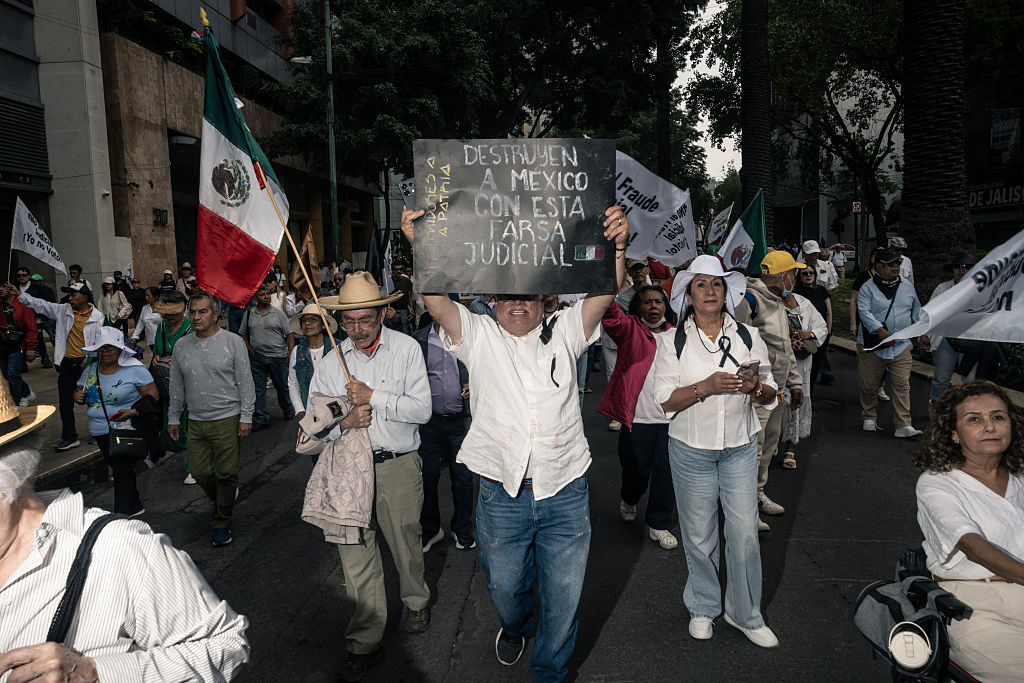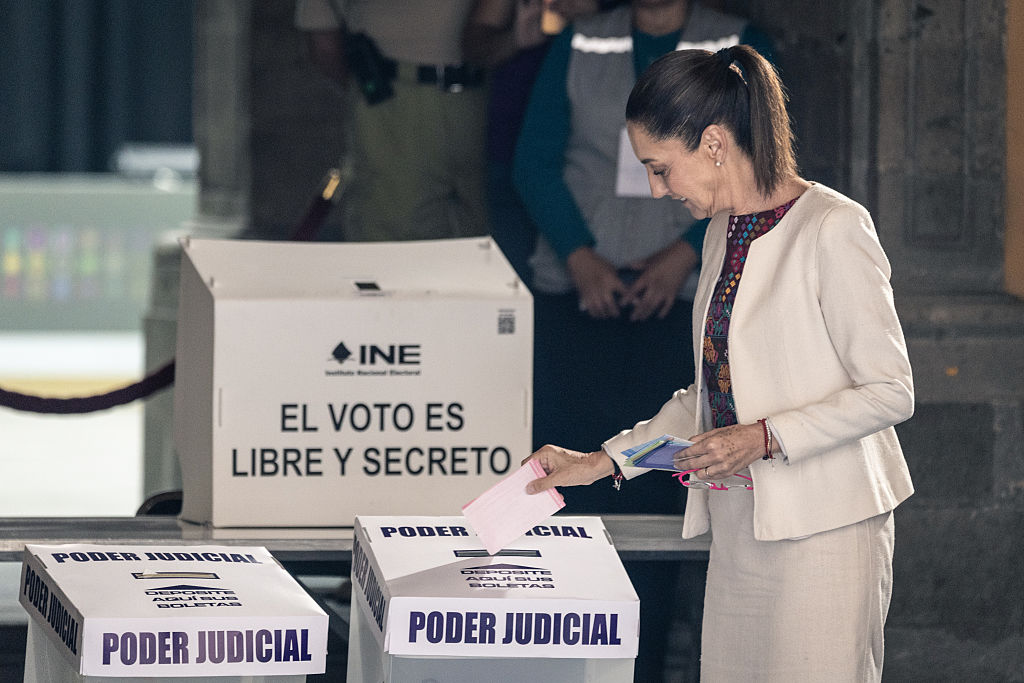MEXICO CITY—President Claudia Sheinbaum has repeatedly asserted that “Mexico is the most democratic country in the world” because it would be the first and only nation to elect all members of the judicial branch, at both federal and local levels. Arguing that the judiciary was corrupt and did not represent “the will of the people,” her government moved forward with a nationwide election on June 1. Predictably, the outcome has raised serious concerns about the future of a still-nascent democracy.
Although Sheinbaum and the ruling party, Morena, consider this experiment a success, the legitimacy of the process has been questioned due to high levels of abstention, documented irregularities, the prevalence of cheat sheets, and other tactics that Morena employed to ensure a favorable result.
Despite Morena’s efforts to mobilize the vote, the abstention rate stood at 87%, resulting in a participation rate of 13%, the lowest since Mexico became an electoral democracy. Even more worrisome, more than half of the voters annulled their ballots, an apparent protest against a process that opposition parties and millions of citizens viewed as farcical or undemocratic.
Over 130,000 individuals registered to serve as electoral observers. This remarkable number prompted electoral authorities to suspect that Morena had dispatched partisan sympathizers to masquerade as observers, thus gaining access to the polling booths and distributing cheat sheets or applying other forms of pressure.
Participation in most states was less than 15%. According to official data, blank and annulled ballots represented 23% of all votes cast, double the amount obtained by the candidate who will be president of the Supreme Court. Civil society organizations and independent observers documented irregularities on election day, including the prevalence of printed cheat sheets, and reports of wafer versions of them, designed to be eaten so as to eliminate the evidence of their existence. When the head of Morena, Luisa María Alcalde, was questioned about the illegality of the party’s tactics, she brushed off the criticism, saying that Mexicans demonstrated their “creativity”.
The election deals a devastating blow to Mexico’s young electoral democracy, signaling a return to a competitive authoritarian regime. Morena will now dominate the executive, legislative, and judicial branches, marking the end of a thirty-year era characterized by the division of power and checks and balances. Overall, this heralds a new era that offers nothing to celebrate.
A tighter grip on power
For months, Morena sought to control the election process and skew the outcome in its favor by establishing selection committees to evaluate thousands of candidates, registering candidates with partisan loyalties, and setting minimal requirements to be a federal judge, federal magistrate, or minister of the Supreme Court, such as having a B average in college, a law degree, and five years of experience in a related field.
Candidates did not compete on a level playing field, as government-backed contenders had access to public resources for self-promotion, while the ruling party distributed cheat sheets to ensure Morena voters would vote for the party’s preferred candidates on an extraordinarily intricate ballot. Voters were tasked with choosing 881 positions from a list of 2,681 federal and state-level roles, with little information available about the qualifications or experience of the candidates.

Mayolo Lopez Gutierrez/Bloomberg via Getty Images
The results represent a political victory for the ruling party, since the winners were precisely the same candidates featured in Morena’s widely distributed cheat sheets. Partisan control of the courts was assured. However, the election also highlighted the lack of legitimacy that has plagued the process since its inception.
The essential conditions needed to ensure a free and fair election had been undermined before election day. Due to former President Andrés Manuel López Obrador and Sheinbaum’s significant budget cuts to the National Electoral Institute (INE), there were fewer than half the voting booths compared to a presidential or mid-term election. Due to the complexity and number of ballots, they were not counted by citizens at the voting booth, as has been customary in every election in Mexico since 1997; instead, they were taken to local INE offices, where the counting has taken days to finish, and independent verification will not happen.
Popularity and loyalty became the deciding factors for the winning candidates. The presidency of the Supreme Court was won by a Morena operative of Indigenous origins, leading the ruling party to celebrate pluralism and diversity, while minimizing Hugo Aguilar Ortiz’s lack of experience, and his role in organizing “consultas populares” (popular referendums) in support of López Obrador’s massive public works.
Three women who were members of the prior Supreme Court and were appointed by López Obrador were returned there via the vote; one of them has faced serious plagiarism accusations regarding both her undergraduate and doctoral theses, and is married to a prominent government contractor. The other two campaigned on their loyalty to the ruling party. The newly established Tribunal of Judicial Discipline, which will assess judicial rulings and have the power to remove judges without appeal, will also be influenced by partisan control. All five of its members have previously worked in Morena governments or have publicly expressed their allegiance to the so-called “Fourth Transformation.”
Judiciary vices untouched
Although the government is presenting the election as a means to combat the vices of the judiciary, it will ultimately fail to achieve this. Had López Obrador and Sheinbaum genuinely aimed to promote a reform that tackled the root problems within the judicial system, they had both the political power and the time to do so. This would have required addressing the fundamental causes of Mexico’s 98% impunity rate for crimes: incompetent and corrupt prosecutors and police officers. Instead, halfway through his term, AMLO began criticizing judges and Supreme Court members who sought to establish constitutional limits on his authority.
The call to unseat the existing Supreme Court and all judges was more an act of vengeance than an effort to root out corruption or nepotism in the courts. The Supreme Court attempted to block the unconstitutional militarization of public security, the destruction of autonomous institutions, and the government’s takeover of the country’s autonomous electoral institute, the INE. Federal judges and magistrates ordered “amparos” (judicial stays) against the construction of the Tren Maya due to its negative environmental impact on the Yucatán Peninsula, among other examples. The judiciary sought to act as a check and balance and was punished for it. Both AMLO and Sheinbaum framed the election as a means of freeing Mexico’s democracy from oligarchic and corrupt elites, opposing their transformational project.
A failed experiment
What Sheinbaum calls “a democratic experiment” has been widely condemned. Former President Ernesto Zedillo, who led Mexico’s transition to electoral democracy in 2000, deemed the election an “assassination of our young democracy.” The Special Rapporteur for the United Nations stated that the reform could eliminate any vestige of judicial independence and lead to court rulings driven by partisan pressures that conflict with international human rights standards. In Washington, members of the Trump administration have raised concerns about the politicization of the judiciary violating explicit articles of the USMCA, and Human Rights Watch worries that a Morena-controlled judiciary could hinder the courts’ ability to act as neutral arbiters in cases involving government accountability or corruption.
Broad condemnation arises from what should seem obvious. Democracies do not typically elect judges because their role is to uphold the law, not to deliver popular or partisan verdicts; only a few countries do this, and elections are mostly limited to lower courts. The politicization of the judiciary transforms it into a weapon for the ruling party, stripping citizens of their rights and contributing to the weaponization of justice against critics and members of the opposition.
Mexico’s experiment has been portrayed as an attempt to eliminate a corrupt and elitist branch of government, linked to what the president refers to as “the long neoliberal night.” However, Sheinbaum and her party seek to graft the trappings of democracy onto a process that undermines democracy and politicizes the justice system. It amounts to an outrageous partisan takeover disguised as a manifestation of the people’s will.






